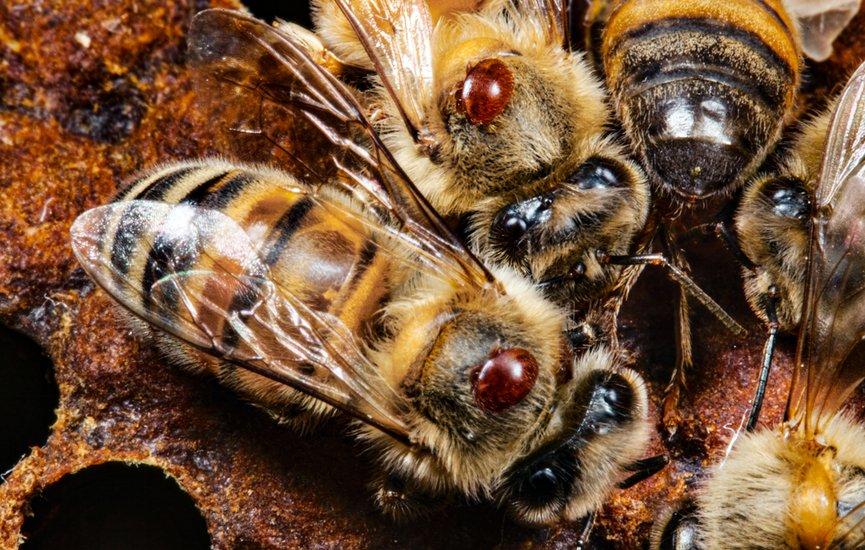Rwanda’s Economy Is Buzzing Literally. Bees pollinate coffee, tea, mangoes, and more, keeping 70% of the population employed and driving 30% of the nation’s GDP. Without them, the country’s crops and livelihoods could collapse.
KIGALI, Rwanda | The survival of Rwanda’s bees and the livelihoods of thousands of beekeepers faces a mounting crisis as pesticides banned in the European Union continue to devastate pollinator populations across the country. Scientists warn that the loss of bees is not just an ecological problem but a major threat to Rwanda’s agricultural sector.
Joseph Ruzigana, a beekeeper in southern Rwanda’s Muhanga district, discovered his 20 newly constructed beehives completely empty one morning. “Fellow beekeepers have also lost plenty of bees to these dangerous pesticides. It looks like we won’t get any honey this season,” he told AFP.
Ruzigana said more than 100,000 beekeepers nationwide are struggling as the few surviving bees are weak and unproductive. “I used to harvest up to 25 kilograms of honey from one hive in a month-long season. That income sustained my family, but all of that has collapsed,” he explained.
While changing climate conditions, including longer rainy seasons, have contributed to the decline, experts and local communities point to pesticides as the primary culprit. Bees play a crucial role in pollinating coffee, tea, avocados, mangoes, beans, and tomatoes crops that underpin 30 percent of Rwanda’s GDP and provide employment for 70 percent of the population.
The crisis is not unique to Rwanda. Neighboring Uganda, Ethiopia, Tanzania, and Kenya are reporting rising bee mortality rates due to similar pesticide use, according to the International Centre of Insect Physiology and Ecology in Nairobi.
Rwanda, striving to boost maize and rice production, relies heavily on pesticides to combat pests like armyworms. However, many of these chemicals interfere with bees’ navigation and reproduction, contributing to colony collapse disorder, where worker bees abandon hives entirely.
Despite Rwanda producing large amounts of pyrethrum, a flower that can serve as a natural pesticide, the country exports the bulk of its pyrethrum extract while farmers turn to imported synthetic alternatives. A 2022 study by Turkey’s Ondokuz Mayis University found that 72 percent of farmers used a pesticide called Rocket, containing profenofos highly toxic to bees.
Jeanne Nyirandahimana, a member of a women’s beekeeping cooperative, described the financial toll: “Average earnings have fallen from 250,000 Rwandan francs ($178) per season to around 30,000 ($21). Every day, we find dead bees on roofs and in hives. It is pesticides like Rocket killing our bees.”
A previous University of Rwanda study revealed that 22 percent of farmers near Lake Kivu used malathion, another bee-killing pesticide. Malathion, banned in the EU, was still exported by Denmark, France, and Germany 12.5 tonnes in 2023, according to the European Chemicals Agency.
Jean Claude Izamuhaye, head of crop production at the Rwanda Agricultural Board, emphasized the importance of pollinators. “They are our natural pollinators, and it is critical that bees are saved,” he said, noting that the board is exploring the increased use of bio-pesticides that are less harmful to the environment.
The continued export of toxic pesticides to countries like Rwanda raises concerns about global food safety. A recent Foodwatch study found that over half of Rwanda’s food exported to the EU contained traces of highly hazardous pesticides banned in Europe. In 2022 alone, EU countries sold 81,615 tonnes of 41 banned pesticides to other countries for agricultural use, according to the Pesticide Action Network.
As beekeepers grapple with declining populations and falling incomes, scientists, advocacy groups, and authorities are urging urgent action. Without immediate intervention, the collapse of bee populations could threaten food security, biodiversity, and the economic stability of Rwanda’s rural communities.
